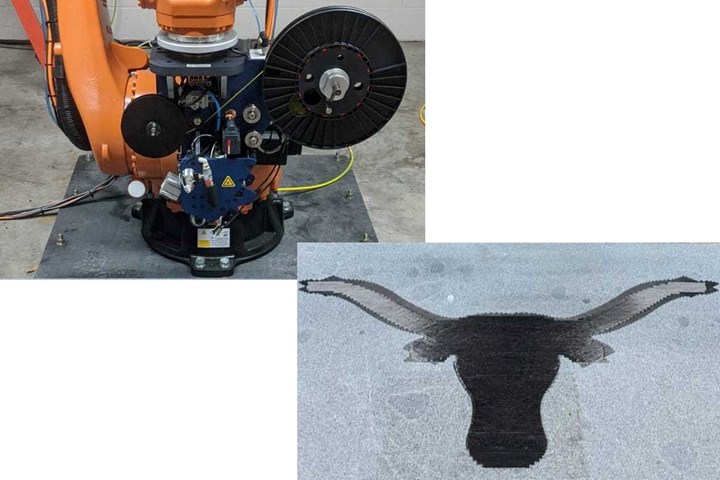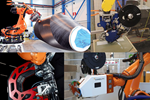UT Austin installs Addcomposites AFP-XS with laser for in-situ consolidation of thermoplastic composites
Modular, compact and versatile AFP system to help University of Texas explore thermoplastic composites technologies.

Photo Credit: Addcomposites
The University of Texas at Austin (Texas, U.S.) boasts one of the top-rated engineering programs in the U.S.. One of its research groups is focusing on controllable in-situ consolidation of thermoplastic composite processing using automated fiber placement (AFP). “In order to achieve this goal,” says James Kuligoski, technical sales engineer for Addcomposites (Espoo, Finland), “they decided to work with us because they wanted a modular, compact and versatile AFP system to perform these experiments, and this is exactly what our AFP-XS system provides.”
UT Austin has augmented the AFP-XS with a high-powered laser, another first for Addcomposites, to achieve the high melt temperatures that thermoplastics require. The laser is equipped with a pyrometer for precise temperature control. The capability is complimented by an external force sensor mounted between the AFP-XS and Kuka (Augsburg, Germany) robot, which will give the UT Austin researchers full closed-loop control over temperature and pressure parameters during thermoplastic layups.
“This closed-loop control, especially with a laser, will widen the capabilities of the AFP-XS for high-end applications,” says Addcomposites CEO, Pravin Luthada. “We are excited to support UT Austin’s research efforts and enable high-speed, high-performance processing. The goal of this collaboration is to eliminate the barriers of knowledge transfer for in-situ thermoplastic processing via AFP.”
“Our goal is to tackle major barriers for the adoption of AFP in-situ consolidated thermoplastic composites,” says Dr. Mehran Tehrani, assistant professor at the Walker Department of Mechanical Engineering.
Addcomposites has worked with UT Austin team to ensure the highest level of communication protocols for the laser integration and will continue to support them as future upgrades become available.
Related Content
-
Plant tour: Joby Aviation, Marina, Calif., U.S.
As the advanced air mobility market begins to take shape, market leader Joby Aviation works to industrialize composites manufacturing for its first-generation, composites-intensive, all-electric air taxi.
-
Rocket Lab begins installation of large AFP machine for rocket production
The 99-ton AFP machine, custom-designed and built by Electroimpact, is claimed to be the largest of its kind, expecting to save around 150,000 manufacturing hours in the Neutron rocket’s production process.
-
PEEK vs. PEKK vs. PAEK and continuous compression molding
Suppliers of thermoplastics and carbon fiber chime in regarding PEEK vs. PEKK, and now PAEK, as well as in-situ consolidation — the supply chain for thermoplastic tape composites continues to evolve.
















